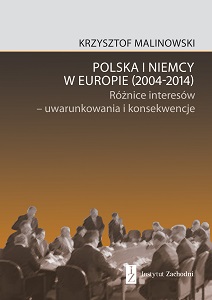
We kindly inform you that, as long as the subject affiliation of our 300.000+ articles is in progress, you might get unsufficient or no results on your third level or second level search. In this case, please broaden your search criteria.

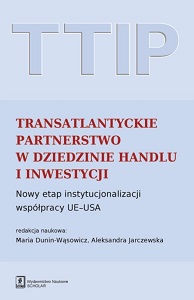
17 czerwca 2013 r. UE i USA ogłosiły „nowe handlowe otwarcie” we wzajemnych relacjach, rozpoczynając negocjacje o ustanowienie Transatlantyckiego Porozumienia w dziedzinie Handlu i Inwestycji (Transatlantic Partnership in Trade and Investment, TTIP). TTIP jest najbardziej znaczącą inicjatywą w historii relacji obu partnerów. Dzięki umowie, zapowiadającej powstanie wspólnego rynku transatlantyckiego, pojawia się szansa strategicznego umocnienia pozycji UE i USA w systemie międzynarodowym. W końcu listopada 2015 r. trudno przesądzić, czy i kiedy negocjacje TTIP zostaną zamknięte; jaki będzie zakres umowy; czy i kiedy wejdzie w życie; czy zapewni warunki do realizacji deklarowanych celów. Zadaniem monografii jest przedstawienie problemów leżących u podstaw toczących się rokowań, ich analiza w kontekście koncepcji i metod funkcjonowania przyszłych instytucji transatlantyckich, a następnie próba oceny rezultatów ewentualnego porozumienia, włącznie z procesami instytucjonalizacji współpracy między UE i USA. Efekty TTIP będą dotyczyć także Polski jako członka UE. AutorzyKsiążka podejmuje ważne i aktualne zagadnienie dotyczące nowej formuły instytucjonalnej dla wzajemnych relacji UE oraz USA w ramach Transatlantyckiego Porozumienia w sprawie Handlu i Inwestycji. Publikacja ma charakter pionierski. Zajmuje się stosunkowo słabo opisanym w badaniach naukowych tematem, głównie dlatego, że umowa nadal jest negocjowana. Co więcej, praca stawia sobie ambitny naukowy cel, starając się ocenić rezultaty TTIP w kilku, niezależnie od instytucjonalnego, wymiarach: ekonomicznym, społecznym, geoekonomicznym i funkcjonalnym.
More...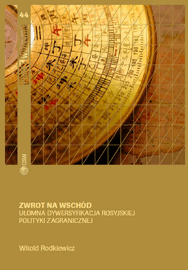
„Zwrot na Wschód”, proklamowany w 2010 roku przez Rosję, nie przyniósł fundamentalnego przełomu w jej relacjach z państwami Azji ani nie dał impulsów do ekonomicznego rozwoju rosyjskiego Dalekiego Wschodu. I chociaż realizowana pod tym szyldem aktywizacja rosyjskiej polityki w Azji przyniosła pewną dywersyfikację polityki zagranicznej, to dywersyfikacja ta ma dwa mankamenty. Po pierwsze, ograniczona jest do sfery politycznej. Udział państw Azji w międzynarodowych więziach gospodarczych Rosji nie zwiększył się w porównaniu z udziałem Europy i Ameryki Północnej. Po drugie, „zwrot na Wschód” okazał się przede wszystkim zwrotem w kierunku Chin. Na wszystkich płaszczyznach – dyplomatycznej, gospodarczej, energetycznej i wojskowej – Pekin stał się najważniejszym azjatyckim partnerem Moskwy. W konsekwencji polityka, której celem było ograniczenie nadmiernego, zdaniem Kremla, uzależnienia Rosji od Zachodu, może uczynić z Rosji „młodszego partnera” Chin.
More...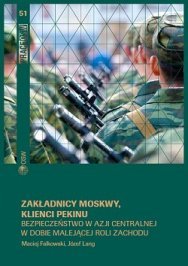
Koniec zachodniej obecności wojskowej w Azji Centralnej oznacza marginalizację wpływu Zachodu na sferę bezpieczeństwa w regionie oraz faktyczne wycofanie się z zaangażowania w rywalizację geopolityczną. Jeśli chodzi o architekturę bezpieczeństwa, nie należy również oczekiwać większej aktywności Chin niechętnych konfrontowaniu się z Rosją, świadomych własnych ograniczeń w tej sferze oraz postrzegających USA jako głównego globalnego rywala. W perspektywie najbliższych kilku lat decydujące znaczenie, jeśli chodzi o system twardego bezpieczeństwa w Azji Centralnej, będzie miała polityka Rosji. Jednym z jej celów będzie dążenie do umocnienia obecności wojskowej i rozszerzenia współpracy w ramach Organizacji Układu o Bezpieczeństwie Zbiorowym. Prawdopodobna rosyjska dominacja w architekturze bezpieczeństwa w regionie nie będzie jednoznaczna z przejęciem przez Rosję faktycznej odpowiedzialności za bezpieczeństwo ani tym bardziej podjęciem próby rozwiązania problemów regionalnych.
More...
One year on from the victorious offensive and announcement of the caliphate, Islamic State is gaining strength as a terrorist organisation which has an army and a para-state of its own. This is breaking apart the fragile order in the Middle East. The world is fascinated with the phenomenon of Islamic State, failing to notice that the Middle East is going through a crisis – and this is the main challenge. IS is an embodiment of the region’s problems and one of its symptoms but it is not the cause of them. The Middle East as we know it is ceasing to exist; borders and countries are vanishing (Iraq and Syria), new para-state entities are coming into existence, new players are entering the stage (from IS to Kurds), and a generation who do not know the old order and are searching for new radical ideas and recipes are growing up. The melting of the Western/US security umbrella stimulates the regional proxy war and regional powers’ (Iran and Turkey) attempts to fundamentally change the post-colonial order. For the West, the concerns about Islamic State are a shadow of the concerns about the future of the Middle East as a whole and the awareness that neither the hard methods (interventions in Iraq) nor the soft methods (promotion of Western values and development model) used in this region over the past few decades are currently working.
More...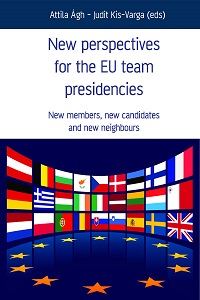
The ‘definition’ of Europe is a social construction that has been transformed historically several times and nowadays it has been in the midst of hot debates. The ESPON 2007 publication ‘Europe in the World’ when it provides a vision about the future of the EU in a global overview, it raises also the question about the definition of Europe in the following way: ‘The division of the World into continents is not an objective scientific reality but a social and historical production, established by Europe and for Europe when it was a dominating power in the World. (…) The analysis of ‘continentality’ does not provide a clear delineation of the Europe continent (…) Objective scientific methods can therefore support different definitions of ‘Europe’ (…) But they can not decide which one is the best from a political point of view.’ (ESPON, 2007:4). Similarly, the ‘definition’ of the EU has been even more a social construction that has changed radically after each wave of enlargement. After the Eastern enlargement from the EU15 to the EU27, however, this definition has changed beyond recognition. At the earlier enlargements the subsequent redefinitions of the EU were present-oriented as conceptual frameworks for the existing Union. With the Eastern enlargement the EU seems to have reached its internal and external limits for a long time, neither widening nor deepening cannot continue as before. Nowadays the EU needs a new, future oriented definition. The EU is not ‘given’, it has be ‘reinvented’ or redefined, and this new definition as a social construct depends on our decision or on our vision where to go.
More...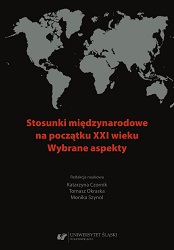
The first two decades of the 21st century were characterised by numerous determinants that strongly destabilise interstate relations, and even have a destructive influence on the shape of international relations in the regional (European, Middle East, African or Asian) and global dimension. The aim of this publication is to offer a broadly understood analysis of selected challenges, threats, and problems in foreign policy of selected European and non-European countries, both in bilateral and multilateral relations in the first and second decade of the 21st century. The studies concern, inter alia, the theoretical aspects of international relations, processes, and phenomena taking place in Europe at the beginning of the 21st century and trends in international relations appearing in other parts of the globe.
More...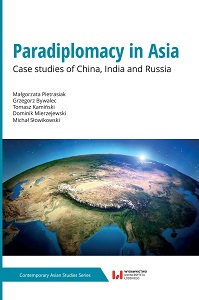
Asian regions and cities have become important international actors but the phenomenon of international engagement of regional and local governments in the Asian countries is still not sufficiently described and recognized in the scientific literature. So far, the research on paradiplomacy mostly concentrated on Europe and North America. However, as shown in this study, the regularities present in Western countries are not necessarily universal. The distinctive features of each Asia n country create quite unique contexts, in which sub-regional actors have to develop their international strategies. Same of those contexts were presented in this study in order to provide better understanding of the conditions of paradiplomacy in Asia.
More...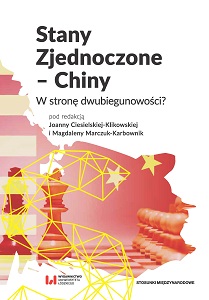
The current relations between the United States and China are multifaceted and multidimensional – they cannot be put in the strict framework created by the researchers but at the same time they give the opportunity for broad interpretation and analysis. Reading the articles contained in „The United States - China: Towards Bipolarity?” monograph leads to conviction that the ongoing debate on the role of the U.S. and China is currently one of the most important for international relations researchers and observers. Forecasting the end of American domination in the world implies questions which state (or group of states) is capable of playing this role. China is often indicated as a power which would be able to take over the primacy from the U.S. in many aspects of the global economy being more and more active politically and economically in all regions of the world. The concept of multipolarity is confronted with the prospect of a specific bipolarity, based not only on cooperation, but also on the rivalry between the United States and China, as well as the high interdependence of these powers.
More...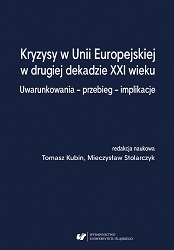
The research objective undertaken in the present work is the analysis of the most important issues regarding the main reasons and manifestations of the crises occurring in the EU in the second decade of the 21st century, together with indicating the possibilities of their overcoming, and discussing their most important implications as far as the further realization of the integration project is concerned. It should be mentioned that only some of the consequences of the EU crises which have occurred in the second decade of the 21st century can be successfully diagnosed. Others will surely set in, only in a shorter or a longer term. Moreover, there is the difficulty with a precise separation of some reasons (sources) from the symptoms of the crises (e.g. the deficit of democracy in the EU). It remains a fact that further process of European integration has become much less predictable than it was a couple of years ago. There emerge various, more or less probable, scenarios of the functioning or disintegration of the EU and its main consequences for the UE member countries, as well as for both the European and the global international system. In the present work, the expressions “the EU crisis” and “the crises in the EU” are used interchangeably. Typically, in literature on the subject these terms are used with different scopes of meaning. The authors of the studies devoted to this problem, including the authors of some of the texts printed in the present volume, draw attention to the fact that a crisis or crises in the EU may be of fragmentary nature, concerning some levels or dimensions of integration within the EU. They claim that the crises in the EU do not have negative influence on the functioning of the Union as a whole. The EU crisis, on the other hand, refers to the crisis of the entire system, the crisis that is spatial and structural, and which poses a threat to the very existence of the EU. It should be kept in mind, though, that the multiplicity and the intensity of the crises, as well as the fact that there have been numerous crises overlapping in a relatively short time in the second decade of the 21st century, have resulted in the situation where the crises in the EU transform, as it were, into the crisis of the EU. Therefore, we have to do with the situation when the crises in the EU in consequence become the EU crisis. The present volume contains 24 articles divided into four parts. The allocation of some articles to a given part of the volume is fairly arbitrary due to the fact that the authors of some texts printed in the present work discuss the issues that concern both the reasons or symptoms, as well as the consequences of the crises under consideration. Because of this, several articles might as well belong to other parts of the volume as well. In the first part, entitled “The theoretical aspects of the crises in the European Union”, there can be found articles written by Zbigniew D. Czachór, Janusz Ruszkowski, Józef M. Fiszer, and Piotr Tosiek. Part Two, entitled “The determinants of crises in the European Union”, contains the studies in which the authors have exposed some internal (intra‑Union) as well as external determinants of the crises occurring in the EU. In this part of the volume there are articles by Dariusz Milczarek and Olga Barburska, Rafał Riedel, Jerzy Jaskiernia, Katarzyna Czornik, and Agnieszka Miarka. The most extensive part of the volume is Part Three, “The symptoms of the crises in the European Union”. Here, one can find texts written by Jacek Pietrucha, Sławomir Czech, Andrzej Podrazy, Michał Dulak, Bogdan Góralczyk, Ryszard Zięba, Mieczysław Stolarczyk, Joanna Ciesielska‑Klikowska, and Anna Pacześniak. In the final part of the present work there are articles by Agnieszka Nitszke, Justyna Zając, Artur Adamczyk, Monika Szynol, Magdalena Tusińska, and Tomasz Kubin. The present study is addressed to a wide range of readers. The editors of the volume hope that the articles contained in the present publication will contribute to the enhancement of the knowledge concerning the main reasons, symptoms, and implications of the crises occurring in the European Union in the second decade of the 21st century. They wish for the present book to become a significant form of scholarly participation from various academic centres of our country in the on‑going discussion devoted to this problem and the voice in the discourse concerning not only the fundamental issues of integration politics of Poland and other EU member countries, but also the matters of preliminary importance for the politics of the security of Poland and other countries, as well as international security in Europe and the world. Because further regression, and all the more the disintegration of the EU, would have difficult to overestimate implications not only for the European international system, but also for the international system globally.
More...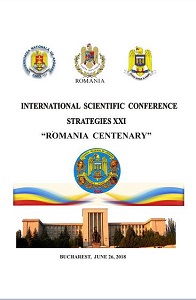
The National Defence College is a unique discussion environment that is widely appreciated at the national and international level. Therefore, we have invited to these debates some notorious academic personalities who – we believe – have managed to transform the scientific communication session Romania Centenary into a milestone of the year 2018.This volume is structured into three chapters that reflect the objectives that had been established by the time we initiated this endeavour. The volume is opened by the chapter 1st of December 1918 – 100 Years Since Building the National State. The section has the ambition to revive the spirit of 1918 and to invigorate the speech related to the role that the civil society and the military had in forging the national unitarian state
More...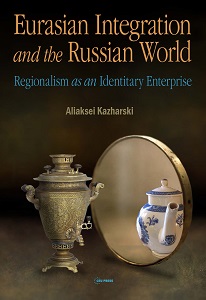
This volume examines Russian discourses of regionalism as a source of identity construction practices for the country's political and intellectual establishment. The overall purpose of the monograph is to demonstrate that, contrary to some assumptions, the transition trajectory of post-Soviet Russia has not been towards a liberal democratic nation state that intended to emulate Western political and normative standards. Instead, its foreign policy discourses have been constructing Russia as a supranational community which transcends Russia's current legally established borders. The study undertakes a systematic and comprehensive survey of Russian official (authorities) and semi-official (establishment affiliated think tanks) discourse for a period of seven years between 2007 and 2013. This exercise demonstrates how Russia is being constructed as a supranational entity through its discourses of cultural and economic regionalism. These discourses associate closely with the political project of Eurasian economic integration and the “Russian world” and “Russian civilization” doctrines. Both ideologies, the geoeconomic and culturalist, have gained prominence in the post-Crimean environment. The analysis tracks down how these identitary concepts crystallized in Russia's foreign policies discourses beginning from Vladimir Putin's second term in power.
More...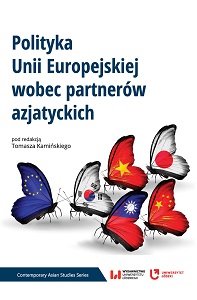
The book discusses the European Union’s policy towards Asian countries. While there are many publications on the EU’s relations with China or Japan, there is a glaring gap in literature covering the contacts between the EU and other Asian partners. All this in the context of Asia’s 35-percent share in EU exports and as much as 45 percent in the case of imports, with the European Union's ties with Asian partners becoming ever closer. Security, common challenges related to climate change or development assistance are only some areas of cooperation. A comprehensive analysis of the policy towards Asian partners will help the reader understand the role of the European Union in Asia and the multidimensionality of relations with countries of the region.
More...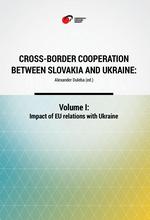
This publication is the first in a series of four publications that present the findings of the research project “Association Agreement between the EU and Ukraine and Cross-border Cooperation between Slovakia and Ukraine: Implications and Opportunities”. The research project was implemented by the Institute of Political Science at the Faculty of Arts of the University of Prešov with the support of the Slovak Research and Development Agency over the period of 2016 ‒ 2019 (project no. APVV-15-0369).
More...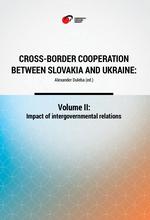
This publication is the second of a series of four publications that present the findings of the research project “Association Agreement between the EU and Ukraine and Cross-border Cooperation between Slovakia and Ukraine: Implications and Opportunities”. The research project was implemented by the Institute of Political Sciences at the Faculty of Arts of the University of Prešov and supported by the Slovak Research and Development Agency overthe period of 2016 ‒ 2019 (project no. APVV-15-0369).This publication includes a set of studies that presents the findings of theresearch into the impact of intergovernmental relations between Slovakia and Ukraine, including national actors in both countries, on the development of cross-border cooperation between regional and local actors at a common border. The aim of the research was to find out how bilateral intergovernmental relations between Slovakia and Ukraine have been developing in terms of creating opportunities and/or obstacles for the development of cross-border cooperation at regional and local level.
More...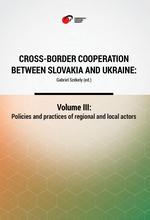
This publication represents the third of a series of four publications that present the findings of the research project “The Association Agreement between the EU and Ukraine and Cross-border Cooperation between Slovakia and Ukraine: Implications and Opportunities”. The research project was implemented by the Institute of Political Science at the Faculty of Arts of the University of Prešov and supported by the Slovak Research and Development Agency over the period of 2016 ‒ 2019 (project no. APVV-15-0369). The set of studies presented in these publications offers analysis of the policies and preferences of regional and local actors who are putting questions of cross border cooperation into practice. Through this analysis, targeted specifically on the regional and local levels, it will be possible to identify, in addition toclear obstacles, the specific opportunities or challenges for Slovak-Ukrainian cross-border cooperation in accordance with the institutional framework of relations between Slovakia and Ukraine on the intergovernmental level and EU-Ukrainian relations on the supranational level. We have attempted to find answers to the question of whether regional actors at the level of the Prešov Self-Governing Region, the Košice Self-Governing Region and the Transcarpathian Region of Ukraine, as well as actors at local level (towns and municipalities, including institutions, businesses and non-governmentalagencies), are able, in terms of their capacities and capabilities, to fully utilize the structure of the political opportunity created by exogenous factors (onthe supranational and national level of relations of the EU and Slovakia with Ukraine) in order to establish mechanisms for cross-border cooperation along the common border. Research into this subject issue also includes (among other things) the essential need to assess existing experience and practice inthe area of cross-border cooperation on the part of regional and local actors on both sides of the border and to examine their perceptions, motivations orstrategies in more detail. Starting from this framework, the project’s research goal was focused on understanding the individual associations between how regional and local actors perceive cross-border cooperation and the border per se. In addition, it is important to know and understand how institutions and individual subjects on the third level mutually and separately prioritize the importance of cross-border cooperation, what influences their perceptions of cross-border cooperation and the border itself, as well as their perceptions of the inhabitants on the other side of the common border. At the same time this is a mapping of those strategies that actors on the regional and local level set for developing cross-border cooperation with partners across the border, as well as towards their own national governments with the aim of achieving the most favourable conditions for the development of cross-border cooperation on the Slovak-Ukrainian border.
More...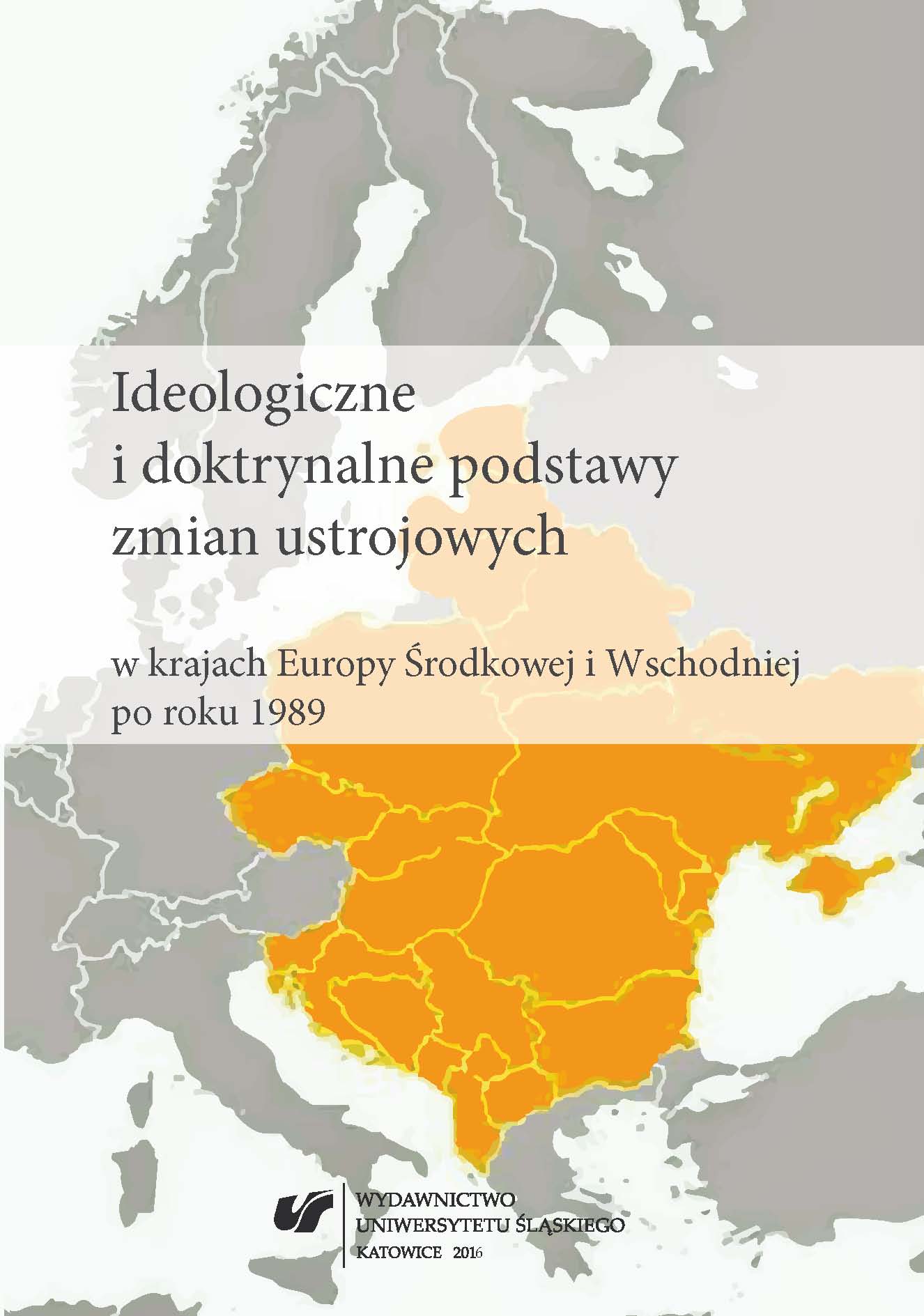
Głównym celem niniejszej publikacji jest próba opisania i wyjaśnienia wszelakiej - nieraz mocno złożonej - problematyki zmian ideologicznych i doktrynalnych, jakie dokonały się i wciąż mają miejsce w Europie Środkowej i Wschodniej. Większość autorów stanowią doktoranci oraz absolwenci Uniwersytetu Śląskiego, jak również innych uczelni, polskich i zagranicznych. Zagadnienia ideologiczne i doktrynalne są sferą niezwykle szeroką, co pozwoliło autorom na oryginalne podejście do tegoż tematu poprzez spojrzenie na nie przez pryzmat swych zainteresowań naukowych. Z tego też powodu praca ta nie zamyka się jedynie w ciasnych ramach danej dyscypliny, a czerpie - poza politologią - z takich dziedzin jak filozofia, socjologia, czy prawo.Monografia podzielona jest na dwie zasadnicze części. Pierwsza - „Ideologiczne aspekty zmian ustrojowych w państwach Europy Środkowej i Wschodniej”, dotyczy filozoficznych podstaw wpływających na kreowanie polityki w poszczególnych państwach, jak również nastrojów panujących w zamieszkujących je społeczeństwach, które przekładają się na tworzenie zaplecza ideologicznego omawianego przez nas regionu. Rozpoczyna ją artykuł Macieja Guzy „Trzecia Pozycja jako ewolucja ideowa radykalnej prawicy w Europie po roku 1989”, w którym autor dokonuje analizy profilu ideologicznego obecnych na scenie politycznej ugrupowań nacjonalistycznych. Drugi tekst autorstwa Natalii Rudakiewicz „Ideologia i działalność ukraińskich prawicowych partii politycznych w procesie modernizacji systemu politycznego i obrony niepodległości Ukrainy (na przykładzie OZ „ Swoboda” i „Prawy Sektor”)” dotyczy badań nad stopniem zaangażowania partii radykalnej prawicy w walkę o niepodległość i suwerenność Ukrainy. Trzecim z kolei artykułem jest tekst Marka Barańskiego poświęcony wizji polskiego samorządu terytorialnego jako społeczeństwa obywatelskiego. Pierwszą część publikacji zamyka artykuł Natalii Minienkowoj „Lustracja na Ukrainie – niezbędna przesłanka konsolidacji demokracji czy krok w odwrotnym kierunku?”, który porusza tematykę transformacji systemowej Ukrainy po „Euromajdanie”.Druga część książki „Wybrane skutki zmian ustrojowych w państwach Europy Środkowej i Wschodniej” ukazuje nam, w jaki sposób omawiana przez nas tematyka wpłynęła na zmiany, które dokonały się w krajach Europy Środkowej i Wschodniej oraz, w jaki sposób zmiany te przejawiają się w polityce poszczególnych państw regionu. Otwiera ją artykuł autorstwa Marka Margońskiego o tytule „Gwardia Narodowa czy Armia Krajowa? Koncepcja systemu Obrony Terytorialnej po 1989 roku”, który dotyka problematyki ewolucji podejścia do zagadnień bezpieczeństwa w Polsce po transformacji systemowej. W dalszej części książki Marek Tyrała w swoim artykule „Przyczyny porażki wyborczej lewicy w wyborach parlamentarnych w Polsce w 2015 r.- na przykładzie Koalicji Zjednoczona Lewica oraz partii Razem” dokonuje charakterystyki lewicowych partii i koalicji wyborczych w trakcie wyborów parlamentarnych w 2015 roku. Harutyun Voskanyan w artykule „Features of military confrontation in Ukraine after Maidan: Wide security front-line” przedstawia perspektywy polityki bezpieczeństwa na Ukrainie po zmianie rządów. Ostatnim artykułem „Pozycja ustrojowa Trybunału Konstytucyjnego w świetle nowych przepisów” autorstwa Izabeli Rudnik skupia się na pozycji i kompetencjach Trybunału Konstytucyjnego, jako organu konstytucyjnego państwa w świetle nowelizacji ustawy o TK z 25 czerwca 2015 roku.
More...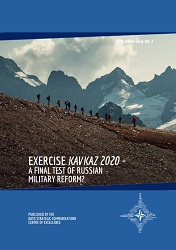
The year 2020 was one of tectonic geopolitical shifts. Strategic competition between Russia and the West intensified, while the COVID-19 pandemic had major strategic implications globally and affected the state of international affairs. In 2020 Russia conducted Kavkaz 2020, a major exercise from its annual cycle, which aimed to convey the Kremlin’s ability to adapt to changing conditions of warfare and to project and integrate military power. In a period of international turmoil and economic recession linked to the effects of the pandemic, Kavkaz 2020 was a cornerstone of Russia’s campaign to leverage its annual training programme, display military power and upgraded military capabilities to its allies, partners and neighbours, as well as to demonstrate operational readiness to its potential adversaries. Messages communicated before and during Kavkaz 2020 demonstrated how Russia could use its military element of state power to achieve the geopolitical or political objectives Kremlin desires in the European information space.
More...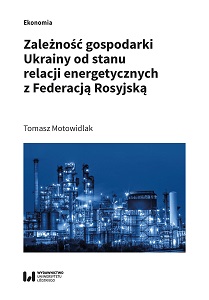
The state of energy relations between Ukraine and the Russian Federation is of great importance for the economy of Ukraine. This significance results not only from the clear asymmetry of these relations in favor of the Russian Federation (RF), but also from its treatment of RF as an instrument of pressure to pursue its economic and political interests in Ukraine.The book presents the sensitivity of the key parameters of the Ukrainian economy, i.e. gross domestic product, balance of payments, trade balance, state of the budget and the amount of debt, to energy factors. The place of the energy sector in the Ukrainian economy was determined and its main internal problems were indicated.The main instruments of the energy pressure of the RF on the Ukrainian economy were identified, including causing crises in the energy and economy of Ukraine, strengthening Ukraine's dependence on supplies of energy resources and fuels from the RF, limiting the role of Ukraine as a gas transit country and promoting destabilization of the energy and economy of Ukraine.The content of the book includes a presentation of the main activities undertaken by Ukraine in order to limit the scope and effects of the use of energy pressure instruments by the RF. These activities include activities of a national nature (e.g. efforts to increase domestic gas production), national-international activities (e.g. efforts to integrate the electricity system with the European system), and international activities (e.g. using the jurisprudence of international arbitration bodies).In conclusion, an assessment of the changes in the period 2010-2020 of the effectiveness of the instruments of energy influence of the RF and of Ukraine's activities aimed at reducing the scope and effects of their application.
More...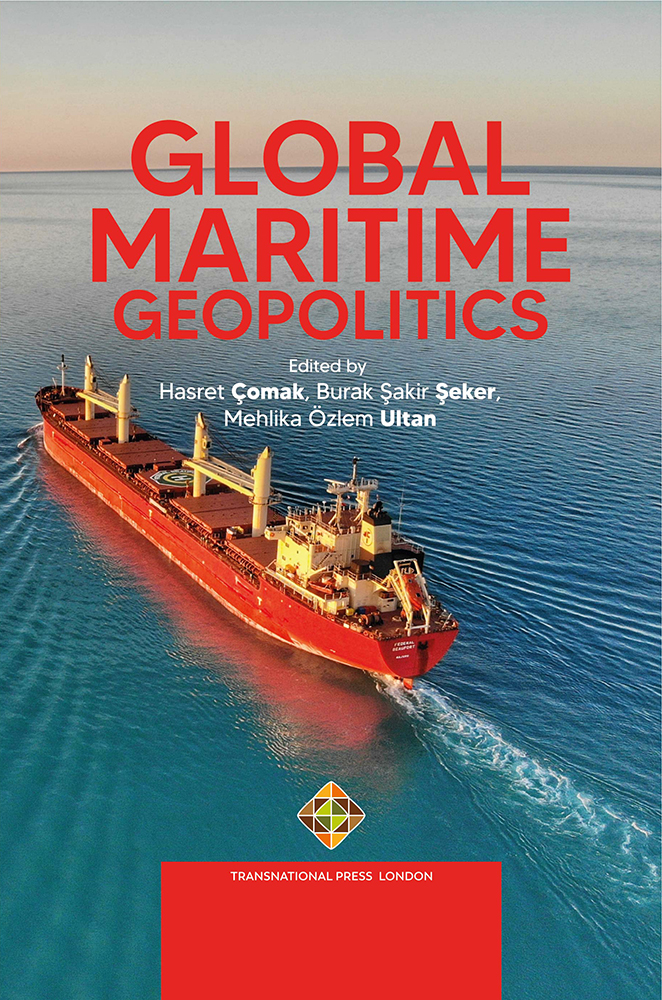
States must develop new approaches, maritime policies, strategies and tactics to cruise through contemporary maritime politics. Soft power, as well as economic, commercial, and logistics factors are of critical importance in establishing marine power. It is critical to promote maritime-related products such as films, serials, literature and art, maritime journalism, and maritime photography as part of governmental policies. Marine and maritime security challenges are becoming more important in today’s world. As a result of all these developments, the preparation of a multidimensional and comprehensive work on the oceans and seas at the global level has been brought to the agenda. Our book has been written to elucidate these concerns and contribute to this important scholarly and policy field. This book can also be useful for wider audiences as a comprehensive volume on maritime geopolitics covering many cases from around the world and discussions from Turkish perspectives.
More...